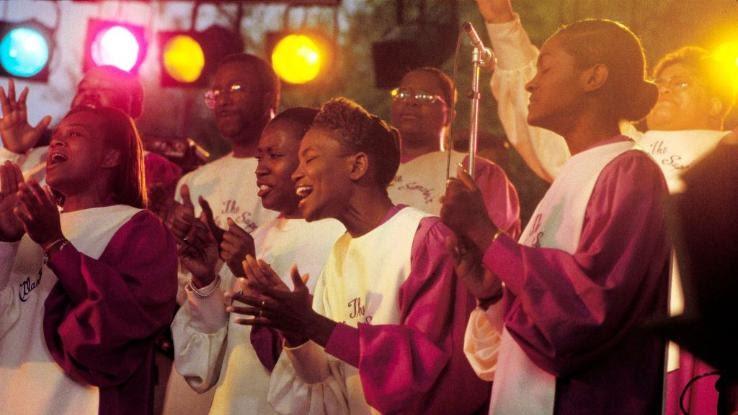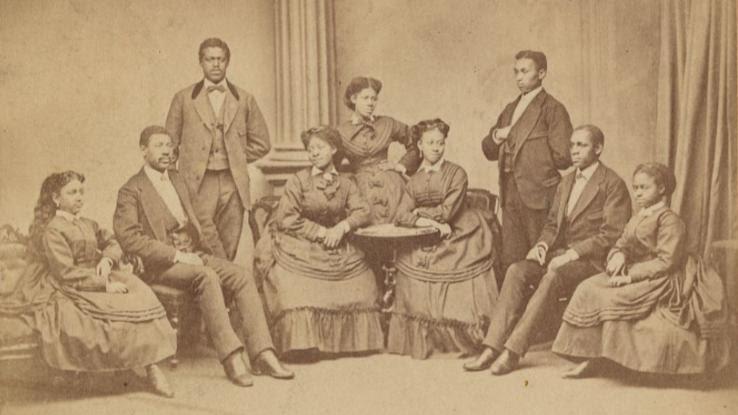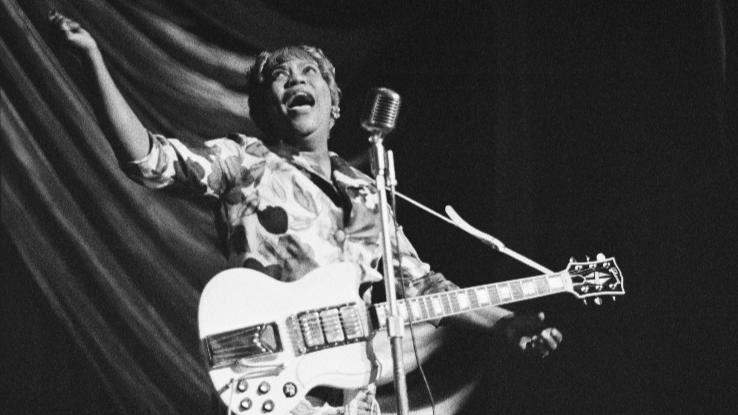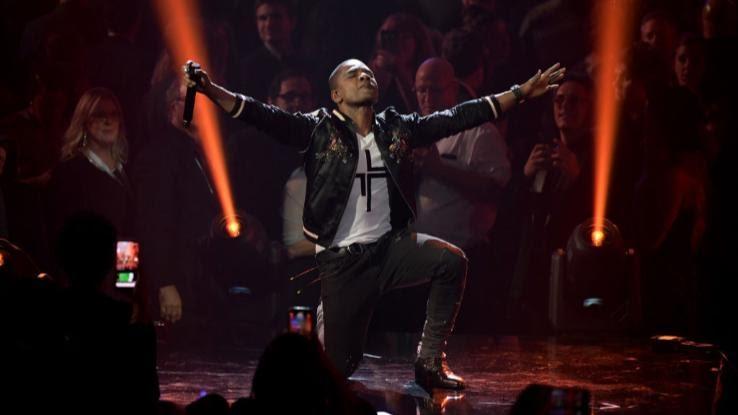Begin Again (Music From and Inspired by the Original Motion Picture) [deluxe Version]

Melodic, soulful and stirring, gospel music is unique in its ability to move people — emotionally and spiritually. And from the rich harmonies and upbeat tempos to the meaningful lyrics and bright free energy, at that place's a lot to love about this historied genre of music that get-go started developing in the late 1600s. The story of gospel music is a fascinating ane that the Academy of Southern California describes as "a product of the religion, civilisation and history that establish the African-American experience," highlighting the genre's importance in Black art but also in Black civilization.
From the traditional songs of enslaved people to early hymns, the mode is a musical melange that continues to evolve. Whether you're a fan of the latest gospel music or tin can't go plenty of traditional gospel songs, information technology's important to learn about the ever-evolving history of the genre. Here we'll explore non only how gospel music became a celebrated genre in its own right just also how information technology continues to impact today'due south songs.
Gospel's Origins Have Roots in the American South
Similar many artistic movements, the origins of gospel music can't necessarily be traced dorsum to a single source in history, but they tin can be traced back to a time period. Some scholars credit British minister Isaac Watts, the "godfather of the English hymnody," for laying downwardly the foundations for the lyrical content of afterward gospel hymns. Watts was credited with writing somewhere between 600 and 750 hymns throughout his life, including the lyrics to the Christmas classic "Joy to the World."

Enslaved African people who were brought to the American South, however, are responsible for the development of the musical elements that began shaping gospel music. African music introduced many elements that would later feature heavily in gospel, including call and response, polyrhythms and improvisation. While enslaved people were gathered in fields laboring or socializing, they also "improvised folk songs," according to Cincinnati Playhouse in the Park.
During the "keen awakening" of the 1730s, white landowners and other British colonists were suddenly convinced of the need to forcibly convert enslaved people to Christianity. Over fourth dimension, this resulted in the germination of a number of Black churches throughout the American Due south, and recently converted Blackness Christians were exposed to a diversity of Watts' hymns and other religious music while attention services. By the 1800s, the African-American community had launched a new musical awakening as people began to blend spirituals and hymns with elements of traditional African folk music, such every bit shouts and chanting of lined hymns. These songs gradually spread throughout worship services at Black churches and formed the backbone of what would become gospel music.
In 1871, a grouping of Blackness artists called the Fisk Jubilee Singers, all but two of whom were formerly enslaved, set out on a musical fundraising tour in an effort to prevent the closing of Fisk Academy, a historically Black college in Nashville, Tennessee. The song artists performed "slave songs" called spirituals, which described the hardships of slavery confronting a backdrop of Christian values. The group's performances would proceed to launch an international tour that was largely credited for introducing slave spirituals to the world.
Gospel Exploded During the 20th Century
The meteoric rise in utilize of the radio in the 1920s gave what would eventually become known as gospel music an even greater platform as its popularity connected to spread. Throughout the 1930s and 1940s, gospel songs connected to flourish, and traditional spiritual elements were combined with other styles. 1 notable example comes from the Golden Gate Quartet — originally known as the Gold Gate Jubilee Quartet — that formed in 1934. The grouping blended spiritual music with barbershop quartet songs and musical elements of jazz and dejection. Although information technology'due south undergone a number of changes in lineups since its inception, the Golden Gate Quartet still performs today.

The same period saw the ascension of Sister Rosetta Tharpe, a recording artist whose gospel recordings soared to popularity. Non only could Tharpe sing, but her skills on the guitar came to be regarded as admittedly legendary. Her blend of gospel lyrics and rhythm would later earn her the nickname of "The Godmother of Rock 'n Curl" and assist pave the way for later secular gospel musicians such every bit Elvis Presley and Aretha Franklin.
Gospel would go on to influence a large number of other styles when artists like Ray Charles blended information technology with R&B and Marvin Gaye effortlessly gave information technology a Motown-style makeover. Other singers, such as Lee Williams and Bill Gaither, achieved widespread recognition amongst the gospel music community. Lee Williams and his group, the Spiritual QCs, began recording gospel songs and touring around 1970. The grouping went on to produce multiple Gospel Superlative X Billboard hits and garner a nomination for the Best Gospel Album from the Soul Train Music Awards. The winner of 10 Stella Awards, Lee Williams remained active every bit a gospel vocalizer until the 2010s when he began experiencing the effects of Alzheimer's.
Today'south Gospel Music Blends Tradition With Modernistic Sensibilities
Despite having been woven into countless other musical styles throughout the years, gospel music is still alive and well in its own right. To become a taste of some of gospel music's virtually popular modern-day incarnations, bank check out online music sites such every bit Black Gospel Radio, which plays free Black gospel music around the clock.

True to the traditions of the past, gospel music remains a scrap hard to pivot down into a single category to this day. There'southward a wide variety of popular artists who make contemporary gospel music, and many of them alloy their own musical styles with traditional gospel-themed messages.
Singer Yolanda Adams utilizes everything from traditional elements such as a fill-in choir to modern, upbeat R&B rhythms and vocals. Darwin Hobbs has become known for his Luther Vandross-similar soul elements, while Kirk Franklin is well known for combining gospel with hip-hop and rap. Even pop artists such as Kanye Westward take begun producing gospel records for today's audiences. West'due south album Jesus Is Rex earned him four 2020 Billboard Music Awards, including Top Gospel Artist, Top Gospel Album, Top Christian Album and Elevation Gospel Song for "Follow God."
Perhaps more than importantly, however, gospel music all the same flourishes in the same places where information technology was first sung to life. Each week, gospel songs menses from the pews of churches beyond the country, as believers gather to celebrate their faith. From its origins in hardship to its best-selling albums, gospel music continues to be a source of strength, inspiration and joy to listeners and singers alike from all over the globe. Whether its themes are heard playing in a Summit-40 radio programme or sung by a local choir, gospel is very much alive, and information technology's vital to recognize its rich history and the meaning information technology carries for Black communities beyond the country.
Source: https://www.questionsanswered.net/lifestyle/gospel-music-origins?utm_content=params%3Ao%3D740012%26ad%3DdirN%26qo%3DserpIndex
Belum ada Komentar untuk "Begin Again (Music From and Inspired by the Original Motion Picture) [deluxe Version]"
Posting Komentar